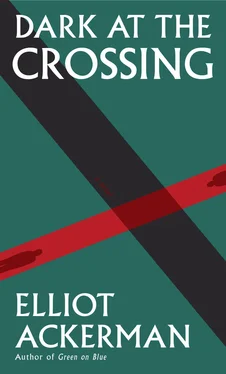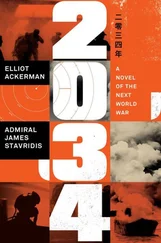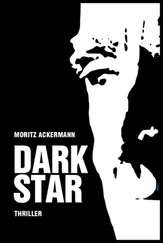Haris finished his rounds, picking up the last empty lunch trays. A hollow chime came from the elevator. It opened, and a single nurse wheeled a handcart toward the dying man’s now vacant room. Stacked atop the handcart were another patient’s personal effects. A familiar black parka caught Haris’s eye. He looked closer: folded next to it was the red Che T-shirt.
Saied was somewhere in the hospital. Outside the door of the vacant room, Haris paced the narrow width of the corridor while his eyes roamed up and down its length. His breath was shallow, nervous, but slowed as he set his mind to what he needed to do. He would confront Saied and demand what had been stolen. With his money back, Haris could at least pay for a taxi to the border. But how would he cross? The border was closed. Then, if he did cross, where would he go? His one contact, Saladin1984, had disappeared. And would Saied still have his money? Likely not.
Within moments, Haris’s convictions melted away. Saied had taken all he had and given him an excuse to do nothing, to remain safely in Antep. The Free Army was dissolving. Had he come here to fight against the regime, which he could still do alongside the Daesh, or for the revolution’s democratic ideals, which seemed hopeless? Against seemed the sole alternative as a thought returned:
Letting him win is cheating.
In the days before Jim’s death, Haris had felt certain he’d been cheated by him. Another IED had clacked off just outside Hurricane Point’s main gate a few mornings after Jim’s birthday. Once again, the bomber had used a baby monitor as a trigger. The blast had woken everyone. Haris watched from one of the sentry towers as Jim shuffled out the gate wearing his board shorts and flip-flops, his rifle slung on his shoulder. He climbed into the crater’s still-smoking belly and recovered a coral-pink transponder. When he came back, he dropped it in the middle of the team room. Into that afternoon and evening, Jim pored over old target files and intel reports, trying to piece together the bomber’s identity. Through a process that seemed more divination than analysis, he assembled a short list of five suspects. One of the five was another member of Kareem Tamad’s family, his uncle.
“He’s an old man,” Haris told Jim, looking at the dog-eared dossier photo.
Their office was empty. The rest of the team had left for dinner. Jim sat shirtless behind his plywood desk, two computer monitors projecting their glow against his face. He peered above them at Haris, who sat in a folding chair by the door.
“Who’s an old man?”
“Hassan Tamad,” said Haris, holding up the photo. “Kareem’s uncle.”
“Your point?”
“You know it’s not him.”
“I don’t know it isn’t him.”
Jim tucked back behind his computer, returning to his work. Haris got up from his chair and left. He would’ve said more, but Jim didn’t know where Hassan Tamad lived or how to find him. There seemed little point in pressing the issue.
Then a couple of days later Kareem Tamad got picked up by the Iraqi Police.
The night of the raid, Jim had logged Kareem and his mother as persons of interest in BATS — Biometric Automated Toolset System — a nationwide law enforcement database. When Kareem got stopped at a checkpoint driving with some friends, the police searched the car and cross-referenced his identity card within BATS. Jim’s log entry then earned Kareem a visit to a holding cell on Hurricane Point.
It was evening when Jim knocked on Haris’s door. In the crook of Jim’s arm Haris looked for a bottle, imagining no other reason for him to visit the terp ghetto again. But when Haris saw Jim wearing his desert camouflage uniform, he knew they wouldn’t be drinking.
“The Iraqis brought the boy in.”
“The boy?”
“Yeah, the boy — Kareem Tamad.”
Haris put on a uniform to match Jim’s. He wished Jim had worn his usual board shorts and tank top, at least that might differentiate them. He dreaded the idea of the interrogation to come and didn’t want to stand in front of Kareem wearing the same uniform as Jim.
They arrived at the detention facility wedged into Hurricane Point’s far corner. Jim swung open the heavy steel gate. Welded to its front was the Ba’ath Party’s eight-pointed star. Haris thought how ignorant the Americans were to disband the Iraqi army, civil service, and police as part of de-Ba’athification while leaving these symbols up and erecting their bases in Saddam’s old palaces.
Inside the one-story blockhouse, an American soldier from the Military Police sat at a plywood desk. Ragged copies of Star and Us magazines rested in stacks on its corners, flanking a black phone. Absentmindedly the MP thumbed through the worn pages, each one limp as a wet rag. Tucked into his bottom lip, an enormous chaw blackened his teeth.
He stood when he saw Jim. “All right there, Sarge.”
“All right,” answered Jim. He fished a folded piece of paper from his cargo pocket. “I’ve got an interrogation clearance for Kareem Tamad.” He spread the form flat on the desk, next to the phone. The MP dialed a long sequence of numbers. Holding on the line, he pulled an envelope of chewing tobacco from his pocket. He offered a plug to Jim, who refused, but none to Haris.
The MP hung up the phone. “No answer,” he said. “Here are his personal effects.” From the desk drawer, he handed Jim a zip-locked evidence bag. “You can get started. I’ll try again in a bit. Tamad’s in lucky-number thirteen.” The MP folded the interrogation clearance in half and slid it into his copy of Star.
The light switch to cell thirteen sat on the wall by its solid steel door. In the outside world, the sun decided night and day. In the cell, that power resided with the jailer.
Jim seemed to understand this. He flicked off the switch. He flicked it back on. Kareem’s shadow frantically broke up the sliver of light which leaked from the foot of the cell door. Then Jim flicked the switch off and left it off. Nervous sounds, like pacing footsteps and a chair or desk being moved, came from the darkness inside.
“Let’s give him a bit more time like that,” said Jim.
Haris fixed his eyes on the ground.
“I just want to know where his uncle lives, okay?”
Haris didn’t reply.
“OKAY?”
“Okay,” said Haris, staring at the switch.
Jim took a heavy breath, turning the lights back on. “It’s his fault if he’s afraid of the dark.”
You’re a liar, thought Haris. A rush of hot blood shot from his stomach to his limbs. Feeling it, he thought of Jim’s tattoo, what he had said about the soul residing in your guts. Jim knew Kareem wasn’t scared of the dark — he was scared of being helpless. The hot blood in Haris’s guts proved to him his soul still felt, even if Jim’s didn’t.
Jim opened the cell door. Haris followed.
Kareem sat in a metal folding chair. Without saying anything, Jim flex-cuffed Kareem’s right wrist to one of its legs. Filling the cell, a plastic table rested just beyond Kareem’s reach. Jim emptied the bag with Kareem’s personal effects across it: pocket change, cigarettes, a comb, a cellphone. Pulled up to the table was a wheeled and cushioned office chair. Jim sat in the chair, fiddled with the mechanics underneath it, and reclined heavily, having loosened the back support. Haris stood, leaning his shoulder against the cold cinder-block wall, just to the side.
“Remember me?” asked Jim, pointing to Kareem’s sprained left arm, the one that hadn’t been flex-cuffed and now hung in a sling.
Haris translated, but instead of simply repeating the words as he usually did, he appended a “he says” to each statement, as if this distanced him by some degree from Jim.
Читать дальше












